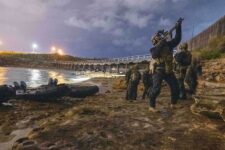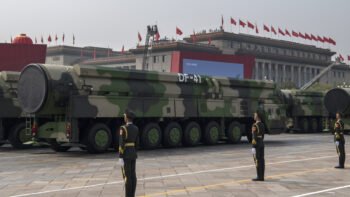
USNS Spearhead mariners work with Ghanaians to curb fishing
Illegal fishing. Yes, Fishing. This growing international problem is a key factor in geopolitical tensions in the South China Sea, piracy off the Horn of Africa, and the deadly narco-trade across Latin America.
Illegal, unreported and unregulated (IUU) fishing, an illicit business which generates annual profits of $15.5 billion to $36.4 billion, poses a significant environmental security threat. It threatens the ecological, economic and food security of many nations, is closely connected with transnational organized crime groups such as drug dealers and arms traffickers, and even contributes to terrorism, maritime piracy and geopolitical instability. These threats require a coordinated whole of government response by the United States working with partner governments, conservation organizations and private industry.
Combatting IUU fishing is a win for the U.S. economy and economies across the world by leveling the playing field for law abiding fishermen and woman. IUU fishing robs countries of an important source of taxable revenue and job security. Catching more fish than a quota allows or distant water fishing fleets straddling Exclusive Economic Zones (EEZs) contribute to declining fish stocks, and present a risk to law-abiding industrial and small-scale fishers’ livelihoods. Moreover, perpetrators of IUU fishing often target the nations least able to respond to the problem – creating a cycle that robs countries of their rightful resources and revenue, which are essential to combatting the problem at the outset.

Coast Guard seize Somali pirates
Second, combatting IUU fishing is a win for U.S. national security. IUU fishing operations often utilize the same networks as narcotraffickers and exploit unemployed fishermen to support these illicit activities. There are numerous instances of such activities around the world, from Costa Rica to South Africa. Off the Horn of Africa, IUU fishing has been linked to piracy as out-of-work fishermen turn to this activity, while poor maritime governance creates the enabling environment for piracy and IUU fishing to fester in tandem. Additionally, IUU fishing creates a serious threat to food security – stripping essential sustenance from people across the globe, and creating the need for migration, which ultimately can contribute to civil discontent.
Third, combatting IUU fishing is a win for ecological security. The Food and Agriculture Organization estimates that 90 percent of global fisheries are fully exploited or overexploited and depleted, while demand for fish continues to grow. This exploitation of fisheries threatens the resiliency of marine ecosystems, and its attendant benefits to all people – from tourism to the seafood industry.
Understanding the underlying factors that contribute to stability and security before a situation becomes destabilized is key to identifying potential solutions. By focusing on threats that arise from non-traditional origins like IUU fishing – the U.S. government can be better poised to address the attendant security challenges associated with it.
The US can take these actions to improve the situation:
- Tapping into the field expertise of the Combatant Commands, which are uniquely positioned to uncover and analyze the threats in their environments and deliver context-specific reporting and strategies;
- Increasing the number of shiprider agreements, which not only serve as an essential tool to exchange knowledge, but also expand the Coast Guard and partner government’s reaches on the ocean;
- Dedicating more capacity-training resources to on-the-ground monitoring and enforcement entities, such as port security and inspection officials.
These solutions exemplify the broad range of U.S. agencies and departments needed to address IUU fishing – for without a whole-of-government strategy to address IUU fishing – the problems only stand to increase.
Amanda Shaver is a research assistant at the Stimson Center. Sally Yozell is director of their environmental security program. They recently launched a report, “Casting a Wider Net: The Security Implications of Illegal, Unreported, and Unregulated Fishing,” which examines the threats posed by illegal fishing.
China’s nuclear arsenal keeps growing amidst leadership purge: Pentagon report
“I would reiterate that we don’t think that conflict [with Taiwan] is imminent or inevitable: We think that we have deterrence today that’s real and strong,” said a senior US defense official.






![RS179755_PMCS2620-FCAS-JPN-5A[1x1]](https://breakingdefense.com/wp-content/uploads/sites/3/2024/12/RS179755_PMCS2620-FCAS-JPN-5A1x1-e1734095138256-225x150.png)
















![RS179755_PMCS2620-FCAS-JPN-5A[1x1]](https://breakingdefense.com/wp-content/uploads/sites/3/2024/12/RS179755_PMCS2620-FCAS-JPN-5A1x1-e1734095138256-350x197.png)


